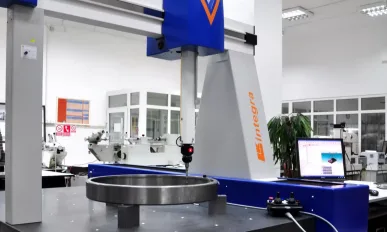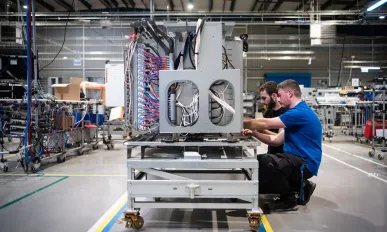Issue 36
URB Group : The King of Bearings
Having built up a formidable reputation since beginning operations in Romania in 1953, bearings manufacturer URB Group continues to innovate and explore new ideas.
Priedemann Facade Experts : Challenging the Norms
Thanks to its specialised knowledge and commitment to research and development, Priedemann Facade Experts ensures that it lives up to its name.
OVHcloud : The Inclusive Data Revolution
Owing to a value-based approach to providing cutting-edge data solutions at affordable prices, OVHcloud has become a trusted partner to organisations all over the world.
NEPI Rockcastle : Innovation, Experience, Excellence.
NEPI Rockcastle has established itself as the leading owner and operator of retail assets in the CEE region, helping to uphold communities and economies in nine countries.
Global Responders Group (GRG) : Answering the Call
Global Responders Group has emerged as a leading provider of integrated risk management solutions, its responsive, adaptive network of expertise able to satisfy any client’s Crisis Management and QHSE needs.
dwp|design worldwide partnership : The Digital Design Era
dwp|design worldwide partnership is better placed than ever before to deliver sustainable, innovative and beautiful designs thanks to sustained investment in people and technology.
Domel : A Driving Force for Good
Slovenia’s Domel has been manufacturing electric motors for use in a variety of home, automotive and industrial applications for seven decades, the cooperative defined by its sustainable, responsible approach to business.
CUMULUS : At the Forefront of the Romanian Design Industry
Romanian architecture and design office CUMULUS outlines ambitious plans to make waves in the construction industry with fully integrated products across several segments.
Blue Air : Responding to a Crisis
Romania’s Blue Air is doing everything in its power to futureproof its business and help the country tackle the ongoing challenges caused by the COVID-19 pandemic.
Albaker Architects : The Architectural Innovator
Albaker Architects is not your usual architecture design practice. It is a company constantly thinking outside the box in the aim of delivering truly inspiring twists to urban landmarks, both in Qatar and internationally.
ADNBA : Adapting to Deliver
Despite the ongoing disruption to business caused by the coronavirus outbreak, Romania’s ADNBA continues to deliver leading architecture and design services for its clients in Bucharest and beyond.
Abdali Hospital : Reinvigorating Medical Tourism
Abdali Hospital is pioneering higher standards in the region’s healthcare industry, the multi-specialty hospital in Amman delivering quality care to local patients and medical tourists alike.
Examining the Sustainable Ethos of BrewDog
Not only is BrewDog the UK’s fastest-growing brand food and beverage brand, it also stands out for its charitable activities and environmental ethos.
What COVID-19 Taught Us About the Supply Chain
Lindsey Mazza, Global Retail Supply Chain Domain Leader at Capgemini, assesses the ongoing impact of the coronavirus pandemic and the lessons to be taken from the crisis.
Why We Need More Women in Engineering
Ben Fielding of Weldwide explores why only 11 percent of the engineering sector in the UK are women, and how this number might be increased in the future.
Learning Goes Virtual : How EdTech is Transforming Education
In the wake of COVID-19, we explore the EdTech sector and its potential to both extend and disrupt traditional learning environments.


















